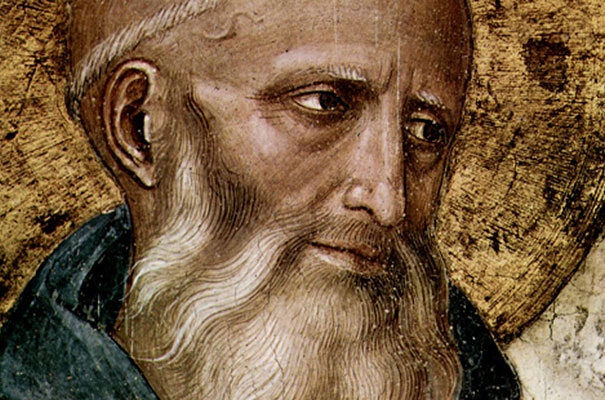Homily for the Solemnity of St. Benedict
Archabbot Kurt Stasiak, OSB
Monday, March 23, 2020

Ordinarily, on this 21st day of March, this church would be packed. Our seminarians would be joining us for the Eucharist. This year most of them have been sent home. Ordinarily, we might have a hundred or so oblates joining us for Mass. This year, many of them, along with our regular guests, pilgrims and friends, join us virtually. This year everyone is staying home. And we monks are home alone. Home alone with St. Benedict.
What would Benedict make of all this? What would he say about these past few weeks, especially about these past few days? I’ve been asking that question a lot lately. And I’ve still got lots of unanswered questions. After all, Benedict was no scientist, no virologist, no expert on spread-of-disease issues. But Benedict was an expert in teaching us how to live together. And Benedict was the seat of the proverbial wisdom on how those who live together can support each other, so they might continue to grow together.
We all know that Benedict thought the life of a monk should be a continuous Lent. I don’t think he would consider all of our individual and collective precautions we are taking against the virus are items for our bona opera. And while he would not suggest that the anxiety, confusion and fear we now face each day are penance for our sins, he would agree that they are certainly reminders of our fragile human condition.
And Benedict might say that the life of a monk should be a continuous acknowledgment of that fragile human condition. That’s why he gave us degrees of humility. Why he instructed us to climb up out of our sloth of disobedience. Why he told us to ask the Lord to make up with his grace what we cannot accomplish by our nature.
The opening verse of our hymn at Vespers last night and again at Lauds this morning struck me as being especially timely for us. Our blessed Father, Benedict / sure guide in dark and troubled days / has shown his countless children here the paths of peace / the Lord’s own ways.
If our holy Father Benedict had ever written a chapter in his Rule about facing a national – even international – crisis, perhaps that chapter would read something like this:
First, let no monk presume to think he is the one most burdened by the present situation, nor should he be tempted to think he is the only one so troubled. Indeed, this is the time when the monks should turn all the more to God in their common prayer and turn all the more to one another in their mutual care and concern.
Those especially given to anxiety should not fall victim either to the vices of pride or despair. Rather let them humbly seek the support of their confreres. Those whom God has gifted with a stronger spirit ought to assist their brothers as they are able. In this way, all the members may be more at peace.
Second, let no one lose hope in God’s mercy. The psalmist reminds us the God of mercy has created our being, has knit us together in our mother’s womb, and decreed every one of our days before one of them came into being. So, the monk should pray earnestly that he who created us out of his boundless love and brought us together out of his mysterious providence walks with us on a path that may seem narrow indeed, but a path he assures us does lead to our salvation.
Finally, as the Lord says in the gospel, “Whoever heeds these words of mine is like the wise man who built his house upon rock.” And so let the monks recall the strong and grace-ful foundations of God’s house in which they live. May they follow the apostle’s advice and work tirelessly, competing with each other not only in showing respect, but in offering love. For love is always patient and kind; it is always ready to trust, to hope and to endure whatever comes. If indeed it is love which is the virtue most difficult to practice, especially in times of distress, the Lord assures us that it is this love that also brings us our greatest reward.
O blessed Father, Benedict,
sure guide in dark and troubled days
show us, your children here on earth
the paths of peace, the Lord’s own ways.